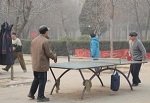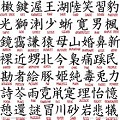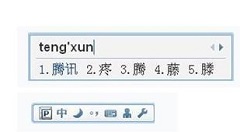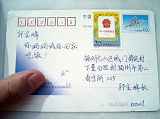The costumers reviews of my books (in Amazon)
https://authorcentral.amazon.com/gp/community
EngineeringStudent reviewed Mandarin Chinese – Fully And Detailed Top Key Language Issues With Pictures and Examples…
I didn’t like the kindle format November 29, 2014
This book goes through basic grammatical structures with example sentences in hanzi, pinyin and English. Suitable for maybe 2nd through 4th year Chinese students, with the beginning of the book more applicable to the 2nd years and the end more applicable to the 4th years. I didn’t like the kindle format, though; found it difficult to flip through without a table of contents and with weird spacing between the letters.
Add a comment View this book’s reviews on Amazon.com
Jack Howard reviewed English common expressions – how to say it in Chinese?-book 1
Excellent book! October 15, 2014
I also purchased book 2. I highly recommend this series to anyone who wants to know the precise Chinese equivalents of everyday English expressions.
Add a comment View this book’s reviews on Amazon.com
Jack Howard reviewed English common expressions-how to say it in Chinese-book2 (English common expressions-how…
Terrific list of expressions. October 15, 2014
This book is great. I’ve been looking for something like this for years. Short and sweet and to the point. I strongly recommend it.
Add a comment View this book’s reviews on Amazon.com
Nez reviewed Enrichment Textbook for Students Learning the Chinese Language
Well written! October 4, 2014
Very impressive , very well written! Definitely an invaluable resource! The review was done on a comnplimentary Ebook.
Add a comment View this book’s reviews on Amazon.com
Steve reviewed Mandarin Chinese – Fully And Detailed Top Key Language Issues With Pictures and Examples…
2 of 2 people found the following helpful
Unbelievably comprehensive reference September 22, 2014
While this book is beyond my skill level, it’s impossible to deny the depth and breadth of such a huge reference book. For intermediate and advanced students who require further assistance in a range of grammatical skills as well as a huge cache of idioms, Chinese-centric proverbs, sayings, and idioms, etc., this book is an incredible value.
Orna lists each item using Chinese symbols, pinyin, and English translations….Read More
While this book is beyond my skill level, it’s impossible to deny the depth and breadth of such a huge reference book. For intermediate and advanced students who require further assistance in a range of grammatical skills as well as a huge cache of idioms, Chinese-centric proverbs, sayings, and idioms, etc., this book is an incredible value.
Orna lists each item using Chinese symbols, pinyin, and English translations. Given the scope of what she’s compiled in her research, I would be very surprised if you didn’t find what you were looking for inside. Additionally, Ms. Taub lists contact information for questions, links to her blog, and other information for those who wish to find answers beyond the textbook.
If you are a student of Mandarin Chinese who needs a handy and amazingly inexpensive resource for a ton of grammar questions as well as a powerful tool to go beyond the limits of most language curriculum, you can’t go wrong with this book.Show Less
Add a comment View this book’s reviews on Amazon.com
6. S. Maness reviewed Mandarin Chinese – Fully And Detailed Top Key Language Issues With Pictures and Examples…
1 of 4 people found the following helpful
I had started reading through this reference. So far … July 18, 2014
I had started reading through this reference. So far it seems very well written. I had received an advance reader copy of this book from Story Cartel in exchange for an unbiased review.
Reviewed By Paula Tran for Readers’ Favorite
Review Rating: 5 stars!
As China is growing vastly economically, many businessmen as well as ordinary people are being exposed to the Chinese language. In North America, the number of Chinese language courses provided in elementary schools to colleges have increased over the years, making it a very popular language. However, because of its complex grammar as well as its long historical background, this language is very hard to learn, and Taub is ready to help you achieve that goal.
Mandarin is a language composed of symbols and various complex tones. It can be daunting for a beginner, and growing up in Taiwan I definitely felt that fear (my first language is English). Taub did a really good job illustrating not only the basics of the language, but also the more complicated aspects. In the beginning, the explanations of the tones were detailed, precise, and accurate, but also not to the point where it chokes the reader. Later in the book, she also points out common words and phrases used in colloquial speech, which not many Chinese language books do today. Throughout the whole book, Taub also makes use of pinyin to illustrate how a particular word is supposed to sound, a good tool for any learner no matter where they are from.
Although simple in design, the book is straightforward and that is the main purpose. Without the fancy schematics, people are able to learn Mandarin quickly and in a time saving manner. However, maybe a fancier cover page will capture the attention of passersby in a bookstore, because first impressions are (sadly) everything.
Reviewed By Gisela Dixon for Readers’ Favorite
Review Rating: 5 stars!
Mandarin Chinese – Fully And Detailed Top Key Language Issues With Pictures and Examples: For Intermediate & Advanced – Book One by Orna Taub is a comprehensive Mandarin Chinese language book for learners who are at least at an intermediate level in learning to speak Chinese. Orna Taub herself has an extensive background as well as practical experience in speaking Mandarin. Since she is not a native speaker of the language either, she is able to relate to the struggles and challenges one can sometimes face while learning a new and complex language. The book is clearly split into neat chapters while providing tips and information on the intricacies of language such as: the use of idioms, colloquial Chinese, common expressions and slang, the rules of changing of tone, grammatical nuances, prepositions and conjunctions, and more. All of the text is accompanied by several pictures or illustrations to better clarify the concept. There are also numerous examples provided throughout the book.
Mandarin Chinese – Fully And Detailed Top Key Language Issues With Pictures and Examples: For Intermediate & Advanced – Book One by Orna Taub is an extremely handy book to have around for any learner of the Mandarin Chinese language. The book is not designed for beginners or learners who don’t know a word of Chinese. Instead, this book is meant to help people who already have a basic knowledge of Chinese to help improve and grow in their use of the language. Orna Taub has done a great job adding to the literature in this field and it is especially important considering the fact that more and more people are learning Chinese nowadays. All in all, a great book and one that I would recommend!
Book Review of #MandarinChineseFullyAndDetailedTopKeyLanguageIssue from #ReadersFavorite – https://readersfavorite.com/…/mandarin-chinese-fully-and-de…
Reviewed by Emilija Ryks for Readers’ Favorite
Mandarin Chinese: An Explanatory Guide to Key Language Issues is written by Orna Taub. This is a resource for Mandarin students by someone that has painstakingly sought the help of native speakers and masters, and seeks to impart her knowledge to anyone that can benefit by it. The book contains clarifications of particles, common words, words for special occasions, slang etc. It is full of examples for each point and it includes the Chinese characters as well as the English letter spelling and the translation in English. Cases where the term used is not usually said are noted in the text. If you already have some learning under your belt about how to speak/read/write Mandarin, this is an excellent guide to some things they likely didn’t teach in the grand scheme of the lessons. There is a fair amount of material that would be natural to a native speaker, but not common if you didn’t grow up in that culture since formal learning tends to be more formal in style.
This is not a ‘teach yourself Chinese’ book – it is an aid for furthering one’s understanding and Orna Taub has given us a great deal to look into in this book. It is like reading someone’s advanced language notes and that really is what it is. I very much enjoyed the range of the examples used for each item in the vocabulary section that takes up most of the bulk of the last section of the book. Orna gives multiple examples of how the words work in a real sentence, though sometimes the sentence is more for an example and, while I don’t think I would ever use it in real life, they are rather entertaining. She includes some pictures as well to further clarify several points. It is a good book to have as a permanent fixture if/when learning Mandarin. Mandarin Chinese contains a lot of information that will take both time and practice to get a handle on, but the benefit to the speaker is great in the long run.















